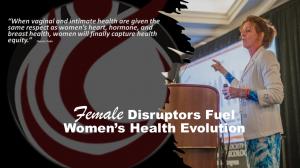Wisconsin Nonprofit Challenging Vagina Stigma to Advance Awareness of Pelvic Organ Prolapse Pandemic
Childbirth and menopause are primary causes of pelvic organ prolapse, yet fifty percent of women suffer silently with the condition due to societal stigma.
Pelvic organ prolapse (POP) is defined as the herniation of pelvic organs into or beyond the vaginal opening. It can cause a variety of distressing symptoms including tissues bulging from the vagina, back or pelvic pressure or pain, urinary or fecal incontinence, urine retention, chronic constipation, sexual dysfunction, or vaginal/vulvar discomfort. These are not isolated concerns; they are interconnected conditions and symptoms impacting millions of women globally.
Recent data underscores a persistent and troubling gap in women’s healthcare. The 2024 Origin Pelvic Health Study, which surveyed 612 women aged 18–59, revealed that 83% experienced at least one pelvic health symptom in the past year, yet 96% had not received a diagnosis.
This stark reality highlights how stigma and limited awareness around conditions like POP are preventing women from seeking essential care. “Pelvic organ prolapse—or any pelvic floor disorder—is still not seen as a ‘respected’ medical condition,” says Dr. Alexandra Dubinskaya, urogynecologist and reconstructive pelvic surgeon. “You can talk about your triple bypass surgery over cocktails, but mention your vagina and the room goes quiet.”
The National Institutes of Health has acknowledged in the NIH 2024 Pelvic Floor PSA that pelvic floor disorders, including POP, are shrouded in stigma, leading to embarrassment and reluctance in seeking help. Efforts are underway to educate both the public and healthcare providers to reduce these barriers.
A 2022 study published in PubMed Central found that up to 50% of women will develop pelvic organ prolapse at some point in their lifetime. Despite nearly 4,000 years of medical reference dating back to the Kahun Gynecological Papyrus circa 1835 B.C., standardized POP screening during routine pelvic exams remains scarce. Current patient histories often omit critical questions about symptoms regarding vaginal, urinary, defecatory, or sexual dysfunction.
The significant shortfall in both patient awareness and practitioner training continues to hinder early diagnosis and effective management, with serious consequences for women's health quality-of-life outcomes both short and long term. Women's Health, Sports, and Orthopedic specialist Sheree DiBiase, PT, clarified the shortfalls she personally experienced within the practitioner space. “I’m a medical provider. I was embarrassed. I was told by all five OB’s in our group there’s nothing to do about it, let alone given a name for what I had. I had trusted them; I was one of them.”
According to Research Nester, the pelvic organ prolapse repair market is projected to grow from $441.22 million in 2024 to over $811.62 million by 2037, highlighting both the medical and economic urgency of addressing this condition.
“An abundance of misinformation exists online, clouding next steps,” Palm adds. “Women deserve better.”
APOPS is committed to amplifying pelvic organ prolapse awareness, obliterating the stigma of vaginal, pelvic, and intimate health, and advocating for early detection and comprehensive care. The vision is a world in which POP screening is a standardized aspect of pelvic wellness checks and all women’s health stigma is eradicated.
________________________________________
About APOPS
The Association for Pelvic Organ Prolapse Support (APOPS) is a U.S.-based global nonprofit patient advocacy organization. APOPS leads the global charge to increase awareness and eradicate the stigma of pelvic organ prolapse and related symptoms.
Mission: To amplify POP awareness, acknowledge patient voice, destigmatize vaginal health, encourage and optimize women’s health empowerment,
and quantify the quality-of-life impacts of POP.
Vision: A world where POP awareness and screening are standardized in pelvic wellness checks and vaginal health stigma evaporates.
Goals: Increase awareness, support women globally, bridge with stakeholders to evolve POP treatment, optimize standardized screening, ensure accurate
data collection, and advance clinician POP curriculum.
Sherrie Palm
Association for Pelvic Organ Prolapse Support
+1 262-706-3177
sherriepalm.apops|gmail.com| |sherriepalm.apops|gmail.com
Visit us on social media:
LinkedIn
Bluesky
Instagram
Facebook
YouTube
X
Other
Legal Disclaimer:
EIN Presswire provides this news content "as is" without warranty of any kind. We do not accept any responsibility or liability for the accuracy, content, images, videos, licenses, completeness, legality, or reliability of the information contained in this article. If you have any complaints or copyright issues related to this article, kindly contact the author above.
Metal Aerosol Packaging Market to Hit USD 13,354.5 Million by 2035, Driven by Sustainability and Consumer Demand | FMI
Unily Appoints Lokdeep Singh as Chief Executive Officer
Honeygirl Debuts 'Denim & Diamonds,' Inspired by Her Real-Life Love Story with Gin Blossoms Guitarist
Kalendarium
Więcej ważnych informacji
 Jedynka Newserii
Jedynka Newserii

 Jedynka Newserii
Jedynka Newserii

Finanse

Uchodźcy z Ukrainy pomogli wygenerować 2,7 proc. PKB Polski w 2024 roku. Napływ nowych pracowników znacznie zmienił polski rynek pracy
Uchodźcy z Ukrainy coraz lepiej radzą sobie na polskim rynku pracy – pracuje 69 proc. z nich – wynika z najnowszego badania przeprowadzonego przez Deloitte dla UNHCR. Jednocześnie wciąż w tym obszarze jest wiele wyzwań, w tym bariery językowe czy kwestie dotyczące uznawania kwalifikacji, np. w zawodach medycznych i prawniczych. Na rosnącej aktywności zawodowej Ukraińców mocno skorzystała polska gospodarka, ale też sam rynek pracy: wzrosła konkurencja, a Polacy uzyskali możliwość specjalizacji i objęcia stanowisk menedżerskich, eksperckich i technicznych.
Ochrona środowiska
W UE wciąż więcej kontroli działań firm w ramach ESG niż zachęt. Konieczne jest złagodzenie podejścia

Instytucje unijne powinny bardziej koncentrować się na celach i możliwościach rozwoju, jakie daje ESG, a nie kontroli działań firm w tym obszarze i obowiązków sprawozdawczych – twierdzą przedstawiciele organizacji Business for Good. Konieczne jest więc złagodzenie obowiązujących regulacji. Europa powinna również dążyć do utworzenia wspólnego rynku o ujednoliconych przepisach i mechanizmach.
Konsument
Wakacje wyzwaniem dla operatorów komórkowych. W najpopularniejszych kurortach ruch w sieci rośnie nawet pięciokrotnie

Długie weekendy i wakacje to wymagający czas dla operatorów komórkowych. W najbardziej obleganych kurortach udział abonentów tylko sieci Play w stosunku do liczby mieszkańców przekracza 500 proc. Dlatego operator planuje dalszą rozbudowę swojej sieci komórkowej do minimum ponad 15 tys. stacji bazowych. W latach 2020–2024 Play zainwestował w sieć i częstotliwość ponad 6 mld zł.
Partner serwisu
Szkolenia

Akademia Newserii
Akademia Newserii to projekt, w ramach którego najlepsi polscy dziennikarze biznesowi, giełdowi oraz lifestylowi, a także szkoleniowcy z wieloletnim doświadczeniem dzielą się swoją wiedzą nt. pracy z mediami.








.gif)

 |
| |
| |
|